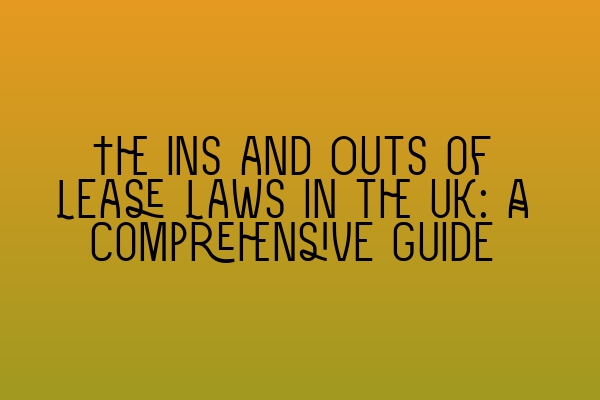The Ins and Outs of Lease Laws in the UK: A Comprehensive Guide
Welcome to another informative blog post from SQE Property Law & Land Law! In this comprehensive guide, we will explore the intricacies of lease laws in the UK, providing you with a solid understanding of this vital aspect of property transactions. Whether you are a tenant, landlord, or legal professional dealing with lease agreements, this guide is a must-read.
What is a Lease?
Before diving into the details, let’s start with the basics. A lease is a legal document that outlines the terms and conditions of a rental agreement. It sets out the rights and responsibilities of both landlords and tenants during the contractual period.
The length of a lease can vary, with short-term leases typically lasting less than a year and long-term leases extending for several years. It is essential for both parties to understand and abide by the terms specified in the lease to ensure a smooth and harmonious relationship throughout the tenancy.
The Importance of Lease Laws
Lease laws serve as the framework that governs the relationship between landlords and tenants. They provide guidance and legal protection for both parties, ensuring fair treatment and resolving any disputes that may arise. Understanding lease laws is crucial to create a secure and stable environment for all involved.
Key Elements of a Lease
Rent and Rent Review:
The lease should clearly state the amount of rent to be paid by the tenant and the intervals at which it should be paid. Rent reviews, if applicable, should also be mentioned.
Tenancy Period:
Specify the length of the tenancy, including the start and end dates. This is especially important for long-term leases.
Deposit:
Detail the amount of deposit required, how it will be held, and the circumstances under which it may be withheld at the end of the tenancy.
Repairs and Maintenance:
Establish the responsibilities for repairs and maintenance. This should include who is responsible for which aspects of the property, such as structural repairs or general upkeep.
Access and Entry:
Clearly outline the landlord’s right to access the property and specify any notice requirements.
Legal Considerations
Lease agreements must adhere to various legal considerations to be valid and enforceable. Failure to comply can lead to significant legal challenges.
One important legal consideration is the need for the lease to be in writing. In most cases, a verbal agreement for a lease is not legally binding. It is vital to have written documentation to protect the interests of all parties involved.
Additionally, certain terms and conditions are deemed unfair and unenforceable under the Consumer Rights Act 2015. These include overly restrictive clauses that may unjustly favor the landlord or impose unreasonable burdens on the tenant. Understanding these legal challenges is essential to avoid common pitfalls.
Consult the Experts
Given the complexity of lease laws in the UK, it is highly recommended to consult a legal professional specializing in property law to ensure that your lease agreement is properly drafted and complies with all necessary legal requirements.
At SQE Property Law & Land Law, our team of experienced solicitors are well-versed in lease laws and can provide expert advice and assistance in navigating the intricacies of lease agreements. Contact us here to discuss your specific needs.
Stay Informed with SQE Property Law & Land Law
For more updates and insights into UK property laws, check out our related articles:
- Updates in UK Property Laws: Key Changes and Implications
- Legal challenges in property transactions: A comprehensive guide
- Navigating Lease Laws in the UK: Essential Guidelines for Tenants and Landlords
- Dominate Property Law Questions: Avoiding Common Pitfalls
- Land Law Revision Tips: Ace Your Exam Preparation
